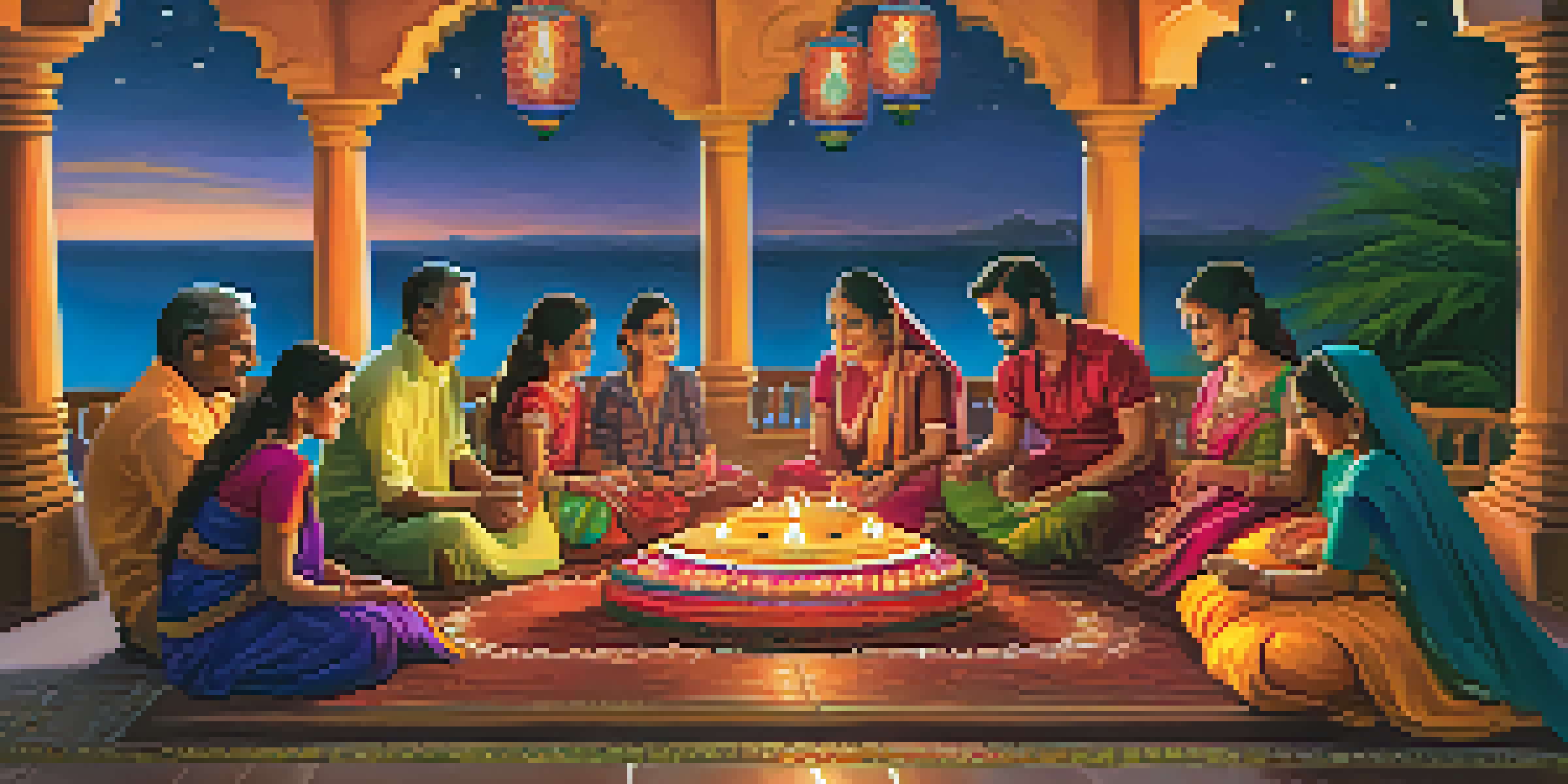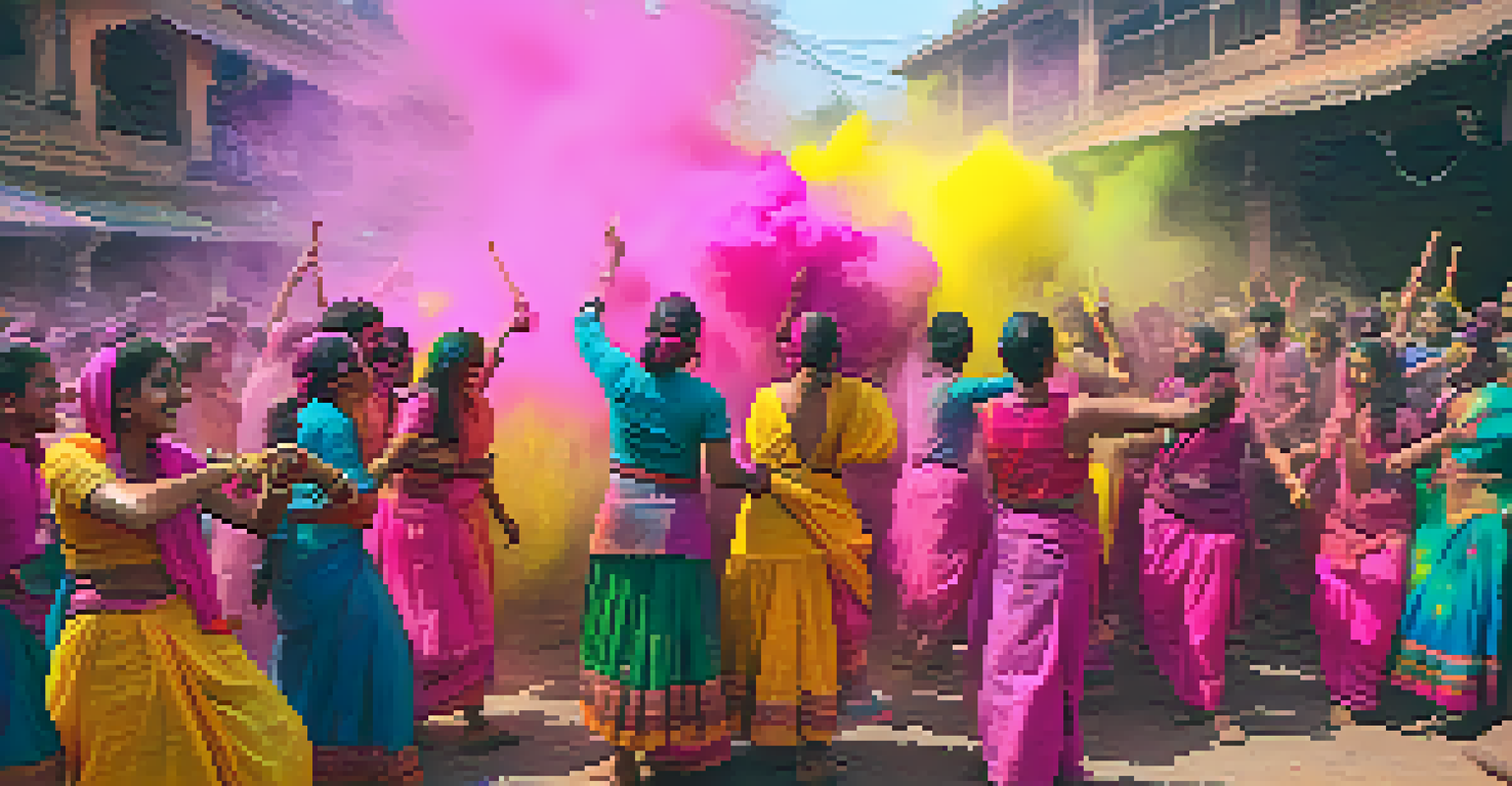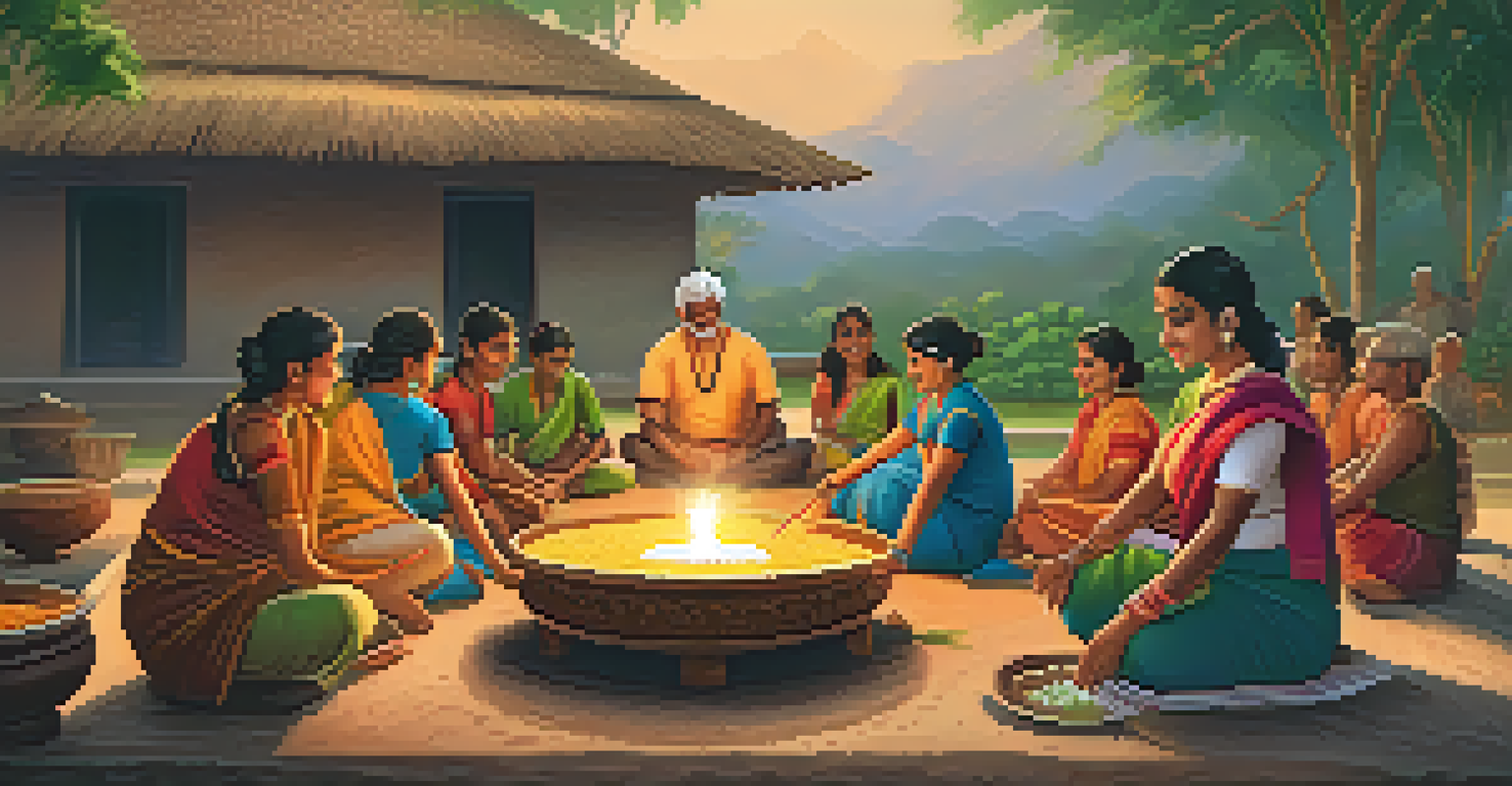Cultural Significance of Reenacting India’s Traditional Festivals

Understanding India's Rich Tapestry of Festivals
India is a land of vibrant festivals, each reflecting its diverse cultures and traditions. From Diwali's lights to Holi's colors, these celebrations are more than mere events; they are a reflection of the country's historical and spiritual ethos. Festivals serve as a reminder of the values and stories passed down through generations, fostering a sense of belonging among communities.
Festivals are a time for family and friends to gather, reflect, and celebrate our shared values and traditions.
Reenacting these festivals allows individuals to connect with their roots in a tangible way. It’s akin to stepping into a time machine, where the past comes alive, showcasing the customs and practices of our ancestors. This cultural immersion not only enriches personal understanding but also enhances community bonds, reminding everyone of their shared heritage.
Moreover, these reenactments often draw attention to the significance of rituals that might be overlooked in modern society. By participating in these traditions, people can appreciate the underlying messages of love, unity, and respect that they convey, ensuring that the essence of these festivals endures.
The Role of Rituals in Strengthening Community Bonds
Rituals are at the heart of India's festivals, serving as a glue that binds communities together. When individuals come together to reenact these events, they share not just their time, but their stories, laughter, and camaraderie. Such collective experiences foster a sense of unity, making participants feel like they are part of something larger than themselves.

Take, for example, the reenactment of the Ramayana during Dussehra. Families and friends gather to witness dramatic performances that narrate ancient tales. This shared experience ignites conversations about values like good over evil, allowing participants to reflect on their own lives while reinforcing their connections with one another.
Festivals Unite Communities
India's festivals foster a sense of belonging and unity through shared rituals and cultural reenactments.
Additionally, these rituals often encourage intergenerational bonding. Grandparents share stories of their own experiences during these festivals, creating a bridge between the past and the present. This exchange not only preserves cultural knowledge but also instills pride in younger generations, ensuring that the significance of these traditions doesn’t fade away.
Cultural Education Through Festival Reenactments
Reenacting traditional festivals serves as an educational platform, imparting valuable lessons about cultural heritage. Participants, especially the youth, learn about the historical significance and the moral lessons embedded in these festivities. This knowledge fosters a deeper appreciation for their culture and encourages respect for diversity.
Culture is the widening of the mind and of the spirit.
For instance, during Pongal, the reenactment of agricultural rituals teaches participants about the importance of gratitude towards nature and hard work. Such lessons are often lost in the hustle of modern life, but by reenacting these traditions, individuals gain insights that can influence their values and actions.
Moreover, these educational experiences extend beyond just participants. Observers, including tourists and locals unfamiliar with the traditions, benefit from witnessing these cultural displays. It creates an opportunity for cultural exchange and dialogue, promoting understanding across different backgrounds.
Preserving Traditions Amidst Modernization
In an era of rapid globalization and modernization, traditional practices can easily get overshadowed. Reenacting festivals acts as a safeguard, ensuring that these age-old customs are not lost to time. It’s a conscious effort to keep the spirit of these traditions alive, even as lifestyles evolve.
Communities often adapt traditional practices to suit contemporary contexts, ensuring relevance while maintaining authenticity. For example, traditional attire might be modernized, but the essence of the celebration remains intact. This balance allows for the continuation of rituals while embracing change, appealing to younger generations who seek both tradition and modernity.
Cultural Education and Awareness
Reenacting traditional festivals educates participants about their heritage while promoting respect for diversity.
By actively participating in these reenactments, individuals become custodians of their culture. They take pride in their heritage and are motivated to pass it down to future generations. This process of preservation is essential, as it allows cultural identities to flourish even in a rapidly changing world.
The Economic Impact of Festival Reenactments
Festival reenactments can significantly contribute to local economies, drawing crowds and boosting tourism. When communities organize these events, they create opportunities for local businesses to thrive. From food stalls to handcrafted goods, the economic benefits are felt across various sectors.
For example, during the reenactment of Baisakhi, local farmers and artisans often showcase their produce and crafts. This not only provides them with a platform to sell their goods but also strengthens the community's economic fabric. The influx of visitors also supports hospitality and transport sectors, further enhancing local livelihoods.
Additionally, the economic impact goes hand-in-hand with cultural preservation. As communities invest in these reenactments, they are more likely to support and maintain their traditional practices. This creates a cycle where culture and economy enrich one another, making the preservation of traditions beneficial on multiple fronts.
Enhancing Interfaith Understanding Through Festivals
India's festivals are a melting pot of various faiths and beliefs, and reenacting these celebrations can promote interfaith understanding. By showcasing the shared values and narratives among different communities, these events foster harmony and respect. They serve as platforms for dialogue, allowing individuals to see the beauty in diversity.
For instance, during Eid, communities often participate in cultural programs that highlight the significance of brotherhood and peace. Such interactions break down barriers and encourage appreciation for one another's cultures. This not only enriches participants but also cultivates a sense of collective identity among diverse groups.
Economic Benefits of Celebrations
Festival reenactments boost local economies by attracting tourism and supporting local businesses.
Moreover, these reenactments can help dispel stereotypes and misconceptions that often exist between different faiths. By engaging in shared festivities, individuals can build friendships and alliances, creating a sense of unity amidst diversity. This collaborative spirit is crucial in today's world, where understanding and acceptance are more important than ever.
Encouraging Environmental Awareness Through Celebrations
Many traditional festivals are closely tied to seasons and natural cycles, offering an excellent opportunity to foster environmental awareness. Reenacting these festivals can highlight the importance of sustainable practices and respect for nature. For instance, during Karva Chauth, the emphasis on moon worship reminds participants of the cycles of nature and our connection to it.
Communities are increasingly incorporating eco-friendly practices into their celebrations, such as using biodegradable materials and promoting local produce. By doing so, they not only honor their traditions but also set an example for sustainable living. This shift encourages participants to reflect on their environmental impact and inspires them to adopt greener practices in their daily lives.

Furthermore, these celebrations can serve as platforms for educating others about environmental issues. Workshops, discussions, and activities centered around sustainability can be integrated into the festivities, making the celebration not only enjoyable but also enlightening. This multifaceted approach ensures that the cultural significance of these festivals is complemented by a commitment to protecting our planet.